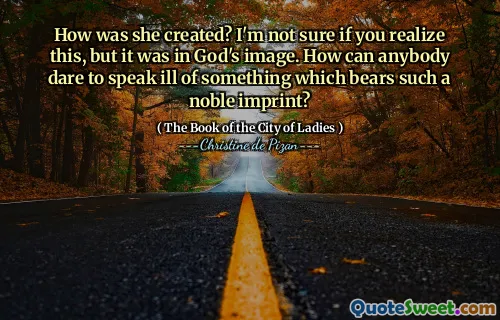"The Book of the City of Ladies" is a seminal feminist work by Christine de Pizan, composed in the early 15th century. In this allegorical narrative, Pizan constructs a city populated by virtuous women, countering the misogynistic views prevalent in her time. The book represents a response to male-dominated literature that often depicted women in negative light, instead celebrating their achievements and moral strength.
Throughout the text, Pizan introduces significant female figures from history, mythology, and the Bible. Through these characters, she highlights the contributions of women to society and advocates for their rightful place in cultural and intellectual discourse. This approach not only honors women but also serves to challenge the patriarchal narratives that sought to diminish their roles.
Ultimately, "The Book of the City of Ladies" is both a celebration of women's experiences and a call for gender equality. By using her writing as a tool for empowerment, Pizan lays the groundwork for future feminist thought and illustrates the importance of recognizing women's contributions to history and society. The book remains a vital text in understanding early feminist literature and the evolution of women’s rights.
More »
Today Birthdays
1970 -
Shonda Rhimes
1599 -
Edmund Spenser
1940 -
Edmund White
1957 -
Lorrie Moore
1691 -
George Fox
1961 -
Wayne Coyne
1934 -
Carolyn See
1965 -
Bill Bailey
1967 -
Masha Gessen
1937 -
George Reisman
1890 -
Elmer Davis
1978 -
Nate Silver
1884 -
Sophie Tucker
1960 -
Matthew Bourne
1980 -
Maria de Villota
1977 -
Orlando Bloom
1976 -
Michael Pena
1952 -
Geoffrey Canada
1951 -
Frank Peretti
1955 -
Trevor Rabin
1808 -
Salmon P. Chase
1947 -
Robert Martin
1927 -
Sydney Brenner
1926 -
Carolyn Gold Heilbrun
1954 -
Denise Morrison
1960 -
Eric Betzig
1968 -
Traci Bingham
1919 -
Robert Stack
1970 -
Keith Coogan
1989 -
Beau Mirchoff
